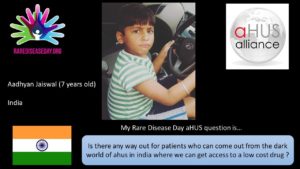Tomorrow, and the day after, a significant event is taking place in New Dehli which is of great importance to aHUS Patients in India.
Tomorrow the first ever consensus conference about aHUS diagnosis and treatment management will begin at the All India Institute of Medical Science.
Key clinicians from around India will be gathering to discuss and agree ways forward for aHUS on the subcontinent.
Convened by Prof. Avrind Bagga, several dozen experts will be working in task groups and exchanging views and suggesting approaches to the key questions about aHUS as the following agenda shows:
Consensus Meeting on Diagnosis & Management of HUS
31 March – 1 April 2017
Dr. Ramalingaswami Board Room, AIIMS, New Delhi
| 31 March | ||
| 9.00 am | Welcome & Introduction | |
| 9.30 – 10.30 am | Plenary I: Key questions | Coordinators: all groups |
| 10.30 – 12.30 pm | Breakout sessions I | All groups |
| 12.30 – 1.30 pm | Lunch | |
| 1.30 – 2.00 pm | HUS Alliance | aHUS India patient representative |
| 2.30 – 4.00 pm | Plenary II: Consensus, unresolved areas | Coordinators: all groups |
| 4.00 – 4.30 | Tea | |
| 4.30 – 6.00 pm | Breakout sessions II | All groups |
| 6.00 – 7.00 pm | Discussion | |
| 7.00 pm | Dinner | |
| 1 April | ||
| 8.00 – 10.00 am | Plenary III: Final presentations | Coordinators: all groups |
| 10.00 – 10.30 am | Comments |
| Group | Topic | Coordinators |
| Group 1 | Investigations for evaluating TMA; role of kidney biopsy; genetics | Ranjeet Theragaonkar, Kirti Sudha Mishra |
| Group 2 | Shigatoxin and infection associated HUS | Anil Vasudevan, Jyoti Sharma |
| Group 3 | Atypical HUS: evaluation & management | Aditi Sinha, SK Patnaik |
| Group 4 | Complement blockade | Pankaj Hari, Sidharth Sethi |
But it is not only clinicians who will be there. Some aHUS patients with aHUS India Foundation’s support will also be contributing through their stories and shared experience of aHUS.
Among them will be the father Ananya whose story featured on the alliance website last year ( click here ) whose sad loss was felt by many aHUS folk around the world as her plight was shared in the social media.
There is no doubt the management of aHUS in India presents a massive challenge. In a population of 1.3 billion people the prevalent aHUS patients could number between 2500 and 7000 , about a sixth of the global aHUS numbers, although possibly much less than that because very few patients survive to build up a prevalent population as happens in western countries. Prof. Bagga’s aHUS registry alone has over 300 patients enrolled.
Eculizumab is difficult to access in India and even when it is, it has to be paid for out of pocket , which is not a realistic nor sustainable option. Alanya received a small number of doses which could be afforded but it in the end it was not enough.
Perhaps the other well know example of access to eculizumab in India was for a boy whose family from the USA were staying in India . Treatment for him was funded through insurance with a successful outcome. The family’s story reveals the different aHUS worlds as they witnessed their son being treated on the same ward as India aHUS children who had no hope of access.
Prof Bagga’s research has produced some hope for a particular aHUS patient cohort in India – those whose aHUS is down to anti factor h antobodies. The Professor has found that AFHA features in more cases of aHUS than would normally be found elsewhere in the world. AFHA aHUS has been managed using Ritixumab by reducing the antibody titre levels.
Resolution of the aHUS challenge in India can only be achieved by those in India. The aHUS India Foundation is playing its part and more patients engaged can make a difference.
The aHUS alliance has been built on the principle that sometimes things can be done better together. Whilst some might diasagree with that notion at least today a spotlight can be placed on the plight of India aHUS patients through the alliance’s website platform , and after tomorrow what aHUS clinicians plan to do about it to find a way out for those like Aadthyan , below.

*featured image is of Kamal D Shah aHUS patient and founder of atypical HUS India Foundation speaking to the United Nations NGO for Rare Diseases

